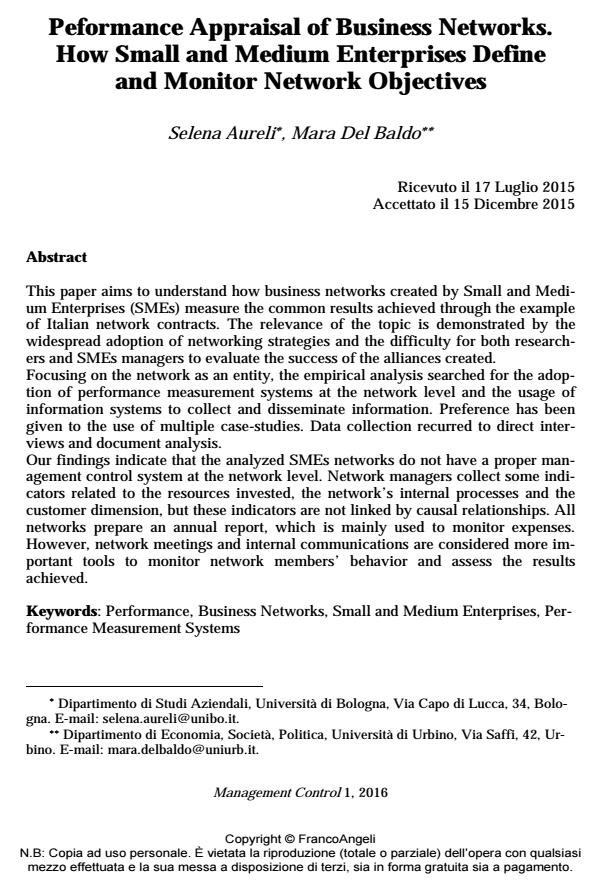Peformance Appraisal of Business Networks. How Small and Medium Enterprises Define and Monitor Network Objectives
Titolo Rivista MANAGEMENT CONTROL
Autori/Curatori Selena Aureli, Mara Del Baldo
Anno di pubblicazione 2016 Fascicolo 2016/1
Lingua Inglese Numero pagine 24 P. 35-58 Dimensione file 144 KB
DOI 10.3280/MACO2016-001003
Il DOI è il codice a barre della proprietà intellettuale: per saperne di più
clicca qui
Qui sotto puoi vedere in anteprima la prima pagina di questo articolo.
Se questo articolo ti interessa, lo puoi acquistare (e scaricare in formato pdf) seguendo le facili indicazioni per acquistare il download credit. Acquista Download Credits per scaricare questo Articolo in formato PDF

FrancoAngeli è membro della Publishers International Linking Association, Inc (PILA), associazione indipendente e non profit per facilitare (attraverso i servizi tecnologici implementati da CrossRef.org) l’accesso degli studiosi ai contenuti digitali nelle pubblicazioni professionali e scientifiche.
This paper aims to understand how business networks created by Small and Medium Enterprises (SMEs) measure the common results achieved through the example of Italian network contracts. The relevance of the topic is demonstrated by the widespread adoption of networking strategies and the difficulty for both researchers and SMEs managers to evaluate the success of the alliances created. Focusing on the network as an entity, the empirical analysis searched for the adoption of performance measurement systems at the network level and the usage of information systems to collect and disseminate information. Preference has been given to the use of multiple case-studies. Data collection recurred to direct interviews and document analysis. Our findings indicate that the analyzed SMEs networks do not have a proper management control system at the network level. Network managers collect some indicators related to the resources invested, the network’s internal processes and the customer dimension, but these indicators are not linked by causal relationships. All networks prepare an annual report, which is mainly used to monitor expenses. However, network meetings and internal communications are considered more important tools to monitor network members’ behavior and assess the results achieved.
Parole chiave:Performance, Business Networks, Small and Medium Enterprises, Performance Measurement Systems
- La Network Governance a supporto dell'Open Innovation: un'analisi della letteratura Palmira Piedepalumbo, Concetta Metallo, Daniela Mancini, in MANAGEMENT CONTROL 3/2017 pp.79
DOI: 10.3280/MACO2017-003006 - The moderating effect of corporate size on the relationship between prospector strategy and management accounting practices Federica Palazzi, Francesca Sgrò, Massimo Ciambotti, Nick Bontis, Lorenzo Gelsomini, in Journal of Management Control /2023 pp.135
DOI: 10.1007/s00187-023-00353-2 - L'impatto del contratto di rete nei processi di internazionalizzazione: alcune evidenze empiriche sulle PMI italiane Andrea Venturelli, Fabio Caputo, Simone Pizzi, in MANAGEMENT CONTROL 2/2018 pp.61
DOI: 10.3280/MACO2018-002004 - Perceived Accuracy of Electronic Performance Appraisal Systems: The Case of a Non-for-Profit Organization from an Emerging Economy Zia Ullah, Naveed Ahmad, Miklas Scholz, Bilal Ahmed, Ilyas Ahmad, Muhammad Usman, in Sustainability /2021 pp.2109
DOI: 10.3390/su13042109 - La Business Intelligence e la Business Analytics nell'era dei Big Data: una analisi della letteratura Arianna Petrosino, Daniela Mancini, Stefano Garzella, Rita Lamboglia, in MANAGEMENT CONTROL 3/2018 pp.31
DOI: 10.3280/MACO2018-003003 - The evaluation of core competencies in networks: the network competence report Francesca Francioli, Massimo Albanese, in Journal of Intellectual Capital /2017 pp.189
DOI: 10.1108/JIC-01-2016-0014 - Traditional management accountants are not dead. Activities and characteristics of Italian controllers working in SMEs Selena Aureli, in Corporate Ownership and Control /2017 pp.238
DOI: 10.22495/cocv14i2c1p10
Selena Aureli, Mara Del Baldo, Peformance Appraisal of Business Networks. How Small and Medium Enterprises Define and Monitor Network Objectives in "MANAGEMENT CONTROL" 1/2016, pp 35-58, DOI: 10.3280/MACO2016-001003